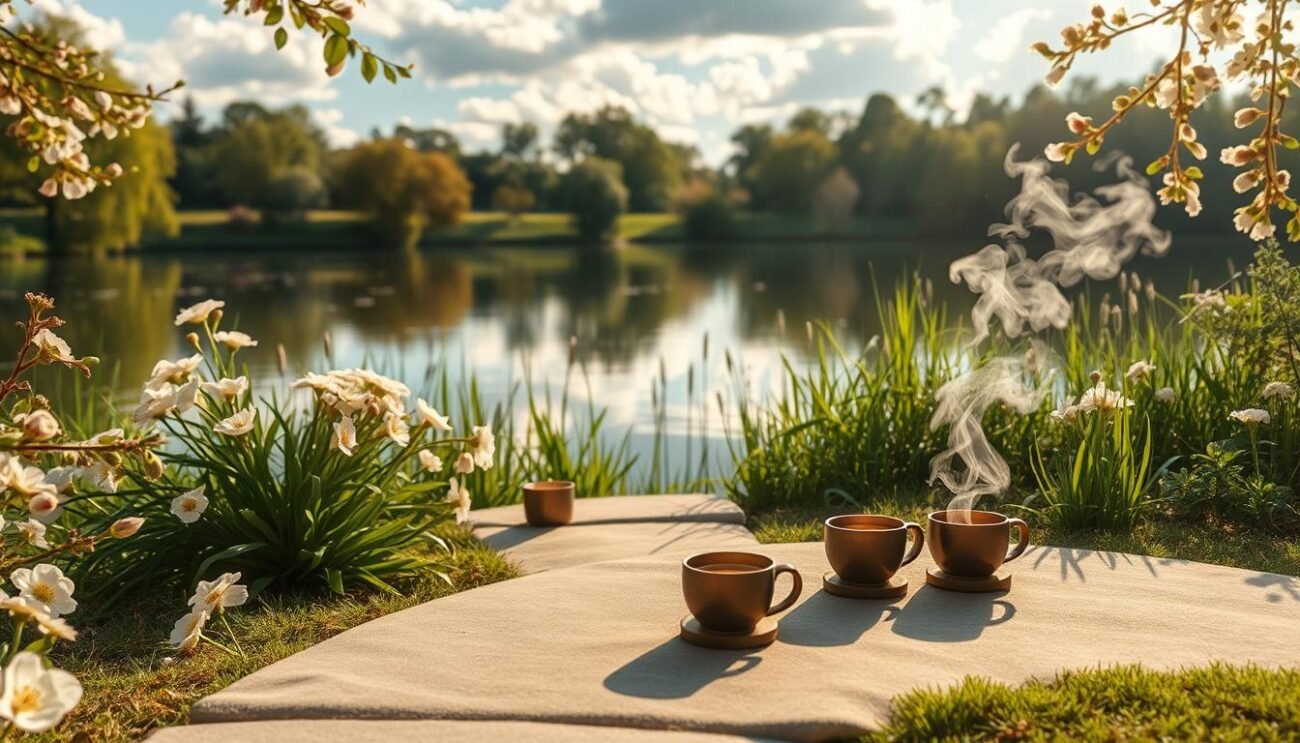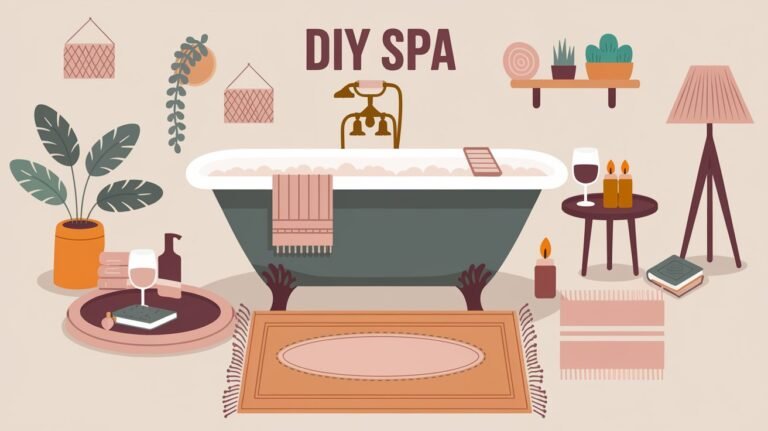In this guide, we’ll look at natural ways to handle stress and find balance. We’ll cover mindfulness, relaxation techniques, and more. These steps will help you find peace and improve your well-being.
Stress is common today, but you don’t have to face it alone. Simple, natural methods can help you deal with daily life better. We’ll explore stress management, mindfulness, deep breathing, yoga, and more.
If you want to reduce anxiety, improve work-life balance, or feel more positive, this guide is for you. It will give you the tools to manage stress naturally. Let’s start this journey together and find a calmer, more fulfilling life.
The Importance of Stress Management
Stress is a normal part of life, but chronic stress can harm our health. Knowing how chronic stress affects us is key to managing our mental and physical health.
Understanding the Impact of Chronic Stress
Chronic stress can harm our bodies in many ways. It can increase the risk of heart disease, high blood pressure, and weaken our immune system. It also leads to mental health problems like anxiety, depression, and burnout.
The Benefits of Finding Balance
Finding a healthy balance in life is essential for our well-being. When we achieve balance, we feel better, sleep better, and work more efficiently. By managing stress, we can improve our health and live a more fulfilling life.
“The greatest weapon against stress is our ability to choose one thought over another.” – William James
Natural Vitality Calm is a magnesium citrate supplement designed to promote relaxation and reduce stress. This gluten-free, vegan, and non-GMO unflavored powder mixes easily into water for a calming daily drink.

Mindfulness Meditation: A Powerful Tool for Stress Relief
In today’s fast world, managing stress and finding balance is key. Mindfulness meditation is a powerful tool to help us find calm. It’s an ancient practice known for reducing stress and bringing peace.
Mindfulness meditation means being fully present, focusing on your breath and thoughts without judgment. It helps you stay in the moment, away from worries about the past or future. This way, you can see your experiences clearly and accept them.
“Mindfulness is the act of being fully present and aware in the current moment, without judgment or distraction.” – Jon Kabat-Zinn
To start with mindfulness meditation, begin with a few minutes each day. Find a quiet spot, close your eyes, and focus on your breath. When thoughts come, gently return to your breath. As you practice more, you’ll feel more calm and relaxed.

Consistency is the secret to mindfulness meditation. Regular practice builds well-being, resilience, and emotional balance. These are important for facing life’s challenges with grace and calm.
Deep Breathing Exercises to Calm the Mind
Controlled breathing can greatly improve our well-being. It helps reduce stress and brings calm and relaxation. I’ll show you two effective deep breathing exercises: Belly Breathing Technique and the 4-7-8 Breathing Method.
Belly Breathing Technique
The Belly Breathing Technique, or diaphragmatic breathing, is easy yet effective. It helps manage stress and anxiety. Here’s how to do it:
- Sit or lie down in a comfy position.
- Put one hand on your belly and the other on your chest.
- Breathe in deeply through your nose, letting your belly rise.
- Breathe out slowly through your mouth, feeling your belly fall.
- Keep doing this for a few minutes, focusing on your breath.
4-7-8 Breathing Method
The 4-7-8 Breathing Method is a strong way to calm your mind and body. Here’s how to do it:
- Sit or stand in a comfy position.
- Breathe in through your nose for 4 seconds.
- Hold your breath for 7 seconds.
- Breathe out slowly through your mouth for 8 seconds.
- Keep repeating for a few minutes, focusing on your breath’s rhythm.
Both the Belly Breathing Technique and the 4-7-8 Breathing Method are great for managing stress. Adding these deep breathing exercises to your daily routine can greatly improve your mental and physical health.
The Pure Zen Tea Tumbler with Infuser is a sleek, leakproof glass travel mug designed for loose leaf tea or fruit-infused water. It includes a stainless steel filter and a double-walled design to keep your drinks hot or cold on the go.
Manage Stress and Feel Balanced: Natural Ways to Stay Calm
Modern life can be tough, making us feel overwhelmed and out of balance. But, there are natural ways to manage stress and find calm. By adding these methods to our daily lives, we can find peace in the chaos.
Mindfulness meditation is a powerful tool for stress relief and balance. It helps us stay present, letting go of worries. Regular practice makes our minds clearer and calmer under stress.
Deep breathing exercises are also effective. They calm our minds and bodies by slowing down our breathing. The belly breathing and 4-7-8 breathing method are great for staying calm.
“When you change the way you breathe, you change the way you think and feel.” – Dr. Andrew Weil
There are also natural remedies for anxiety and stress to try. Herbal teas and supplements like chamomile, lavender, and ashwagandha help relax and manage stress. Adding these to our daily routine can help us stay calm.
By using these natural ways to manage stress and feel balanced, we can find inner peace. Mindfulness, breathwork, and natural remedies help us face life’s challenges with balance and calm.
The Healing Power of Yoga
Yoga is a powerful practice that changes our body, mind, and spirit. It helps us relax, lowers stress, and brings balance to our lives. Adding gentle yoga poses to your routine can unlock yoga’s healing benefits.
Gentle Yoga Poses for Relaxation
Gentle yoga poses calm the mind and soothe the body. They help us find deep relaxation. Here are a few poses to help you unwind:
- Child’s Pose: This pose lets you surrender and relax, folding forward and resting your forehead on the mat.
- Reclined Bound Angle Pose: Known as Supta Baddha Konasana, it opens the hips and encourages deep breathing. It helps reduce tension and stress.
- Legs-Up-the-Wall Pose: This pose reverses gravity’s effects, calming the nervous system and relieving fatigue.
Practicing these poses lets you experience yoga’s healing power. It brings tranquility and balance. Yoga’s journey can lead you to a more serene and fulfilling life.
“Yoga is the journey of the self, through the self, to the self.” – The Bhagavad Gita
Natural Remedies for Anxiety and Stress
Alongside lifestyle and mindfulness practices, natural remedies can help manage anxiety and stress. Herbal teas and supplements offer a gentle, holistic way to find balance and calm.
Herbal Teas and Supplements
Herbal teas are known for their soothing and restorative properties. Herbs like chamomile, lavender, and lemon balm help promote relaxation and reduce anxiety. Drinking these teas daily can be a simple yet effective way to manage stress and find tranquility.
Supplements like ashwagandha, valerian root, and magnesium also offer natural support for anxiety and stress. They have been studied for their potential benefits in reducing anxiety symptoms and supporting overall well-being. Always consult with a healthcare professional before starting any new supplement regimen to ensure safety and efficacy.
When using natural remedies, it’s important to listen to your body and find what works best for you. Try different herbal teas and supplements, and be patient as you discover the right combination to help you feel balanced and restored.
“Herbal teas and supplements can be a gentle, holistic way to find balance and calm amidst the stresses of daily life.”
Creating a Work-Life Balance
It’s key to find a balance between work and personal life to manage stress and feel good. As someone who works, I know it’s tough to balance career and personal life. But finding this balance is vital for your happiness and doing well at work.
Here are some effective work-life balance strategies to consider:
- Prioritize time management. Plan your day well, setting aside time for work and personal stuff. This keeps you organized and stops work from taking over your personal time.
- Set boundaries. It’s okay to say “no” to things that mess with your balance. Tell your boss and family when you’re free and what you can handle.
- Take regular breaks. Take short breaks at work to refresh and recharge. Get up, walk, or do something relaxing.
- Prioritize self-care. Make sure you sleep well, eat right, and exercise. Taking care of your body and mind helps you handle stress better.
- Disconnect from work. When you’re off work, really try to leave work behind. Spend time with loved ones, do hobbies, or enjoy leisure activities.
“The key to work-life balance is to not let one area of your life completely dominate the other. It’s about finding harmony and making time for what’s important to you.”
By using these strategies, you can live a more balanced and fulfilling life. You’ll do well at work and enjoy your personal life too.
Healthy Coping Mechanisms for Stress
When life gets tough, it’s key to have good ways to cope. Journaling and creative activities are great for managing stress.
Journaling: A Therapeutic Outlet
Writing down your thoughts can really help. Journaling lets you share your feelings in a private way. It helps you clear your mind, find answers, and understand yourself better.
There are many ways to journal, like writing freely or using prompts. Studies show it can lower anxiety and depression. It also boosts your immune system and physical health.
Creative Outlets: Unleashing Your Imagination
- Painting, drawing, or coloring can help you enter a state of flow, where you become fully immersed in the present moment.
- Writing fiction, poetry, or even a personal blog can be a therapeutic way to explore your inner world and express yourself.
- Engaging in a hands-on hobby, such as woodworking, gardening, or cooking, can provide a sense of accomplishment and mindfulness.
Being creative is a great way to fight stress. It lets you use your imagination, focus, and feel joy and fulfillment. Whether you’re skilled or new to art, creative activities can change your life for the better.
“The true essence of healing is the ability to be present, to see things as they are, to feel what we feel, and to accept life on its own terms.”
The Art of Positive Self-Talk
How we talk to ourselves greatly affects our stress and well-being. Positive self-talk is a key tool. It helps us have a supportive inner voice, boosts resilience, and brings balance to our lives.
Positive self-talk changes our thoughts and views in a good way. We focus on our strengths and celebrate our wins. We also tackle challenges with a positive mindset.
Starting positive self-talk takes time and effort. But the benefits are huge. It makes us kinder to ourselves, lowers stress, and boosts our mood and confidence.
Here are some tips to start positive self-talk:
- Identify and challenge negative thoughts. Notice when you’re too hard on yourself. Change those thoughts to positive ones.
- Speak to yourself with kindness and encouragement. Think about what you’d say to a friend in need. Use that kindness for yourself too.
- Celebrate your successes, no matter how small. Recognize your hard work and wins. Give yourself credit and praise.
- Practice positive affirmations. Say uplifting things to yourself. This helps keep a positive mindset.
Learning positive self-talk is a journey. But the benefits are huge. Being kind to ourselves leads to peace, resilience, and well-being.
“The greatest weapon against stress is our ability to choose one thought over another.” – William James
Grounding Exercises for Centering and Calm
In today’s fast world, it’s easy to feel overwhelmed. Grounding exercises can help you find calm and center. These simple practices keep you in the present moment, helping you deal with daily life’s challenges.
Connecting with Nature
Connecting with nature is a powerful grounding technique. Spending time outside, like walking in a park or hiking, can greatly improve your well-being.
Being in nature engages your senses and makes you more aware. The sights, sounds, and smells of nature calm the mind and body, reducing anxiety and restoring balance.
- Take a mindful walk, focusing on your footsteps and the sensations in your body as you move.
- Find a comfortable spot to sit or lie down and observe the natural world around you, noticing the colors, textures, and movements.
- Engage in a simple grounding exercise, such as placing your hands on the ground or a tree and feeling the connection to the earth.
Grounding exercises that involve nature help you feel more present and peaceful. They help you manage stress and stay balanced.
Conclusion
In this article, we’ve looked at many natural ways to handle stress and find balance. We’ve talked about mindfulness, deep breathing, yoga, and natural remedies. These methods help calm our minds, soothe our bodies, and bring peace.
By adding these techniques to our daily lives, we can deal better with life’s challenges. We can reduce stress and feel better. Simple actions like yoga, herbal teas, or nature walks can make a big difference.
I urge you to keep using these natural ways to stay calm as you care for yourself. Taking care of your mind and body improves your life. It also helps you face challenges with strength and clarity. Remember, finding balance is possible, and you have the power to do it.
FAQ
What are the benefits of finding a healthy work-life balance?
Finding a healthy work-life balance can greatly improve your life. It reduces stress and boosts your mental and physical health. It also makes you more productive and happy.
By balancing work and personal life, you live a more fulfilling life. It helps you enjoy both your job and personal time more.
How can mindfulness meditation help manage stress?
Mindfulness meditation is great for reducing stress. It teaches you to focus on the present moment. This helps you feel less anxious and more relaxed.
Regular practice makes you more aware of your thoughts and feelings. This helps you handle stress better.
What are the benefits of deep breathing exercises?
Deep breathing exercises, like Belly Breathing and 4-7-8, are very helpful. They lower your blood pressure and heart rate. They also make you feel more relaxed.
These exercises activate your body’s relaxation system. They help you feel calm and stress-free.
How can yoga aid in stress management?
Yoga is great for managing stress and finding peace. Gentle poses like child’s pose and forward fold calm your mind. They also reduce muscle tension.
Adding yoga to your routine can help you feel less stressed. It brings balance to your life.
What are some natural remedies for anxiety and stress?
Herbal teas and supplements can help with anxiety and stress. Teas like chamomile and lavender calm you down. Supplements like ashwagandha and omega-3 fatty acids help your body handle stress better.
These natural options are good for your self-care routine. They can help you feel more relaxed and balanced.
How can positive self-talk help manage stress?
How you talk to yourself affects your stress levels. Positive self-talk boosts your confidence and resilience. It helps you feel more balanced.
By replacing negative thoughts with positive ones, you manage stress better. This keeps your outlook positive.
What are the benefits of grounding exercises?
Grounding exercises, like connecting with nature, reduce stress. They help you feel calm and centered. They counteract stress and anxiety.
These exercises bring balance to your mind and body. They help you feel more grounded and relaxed.










